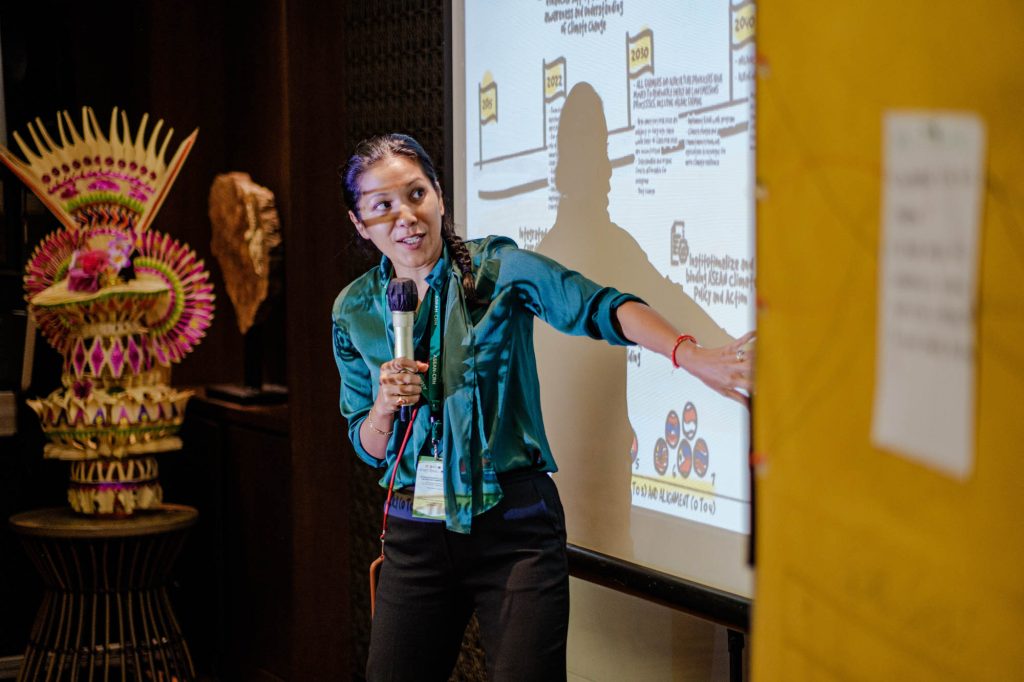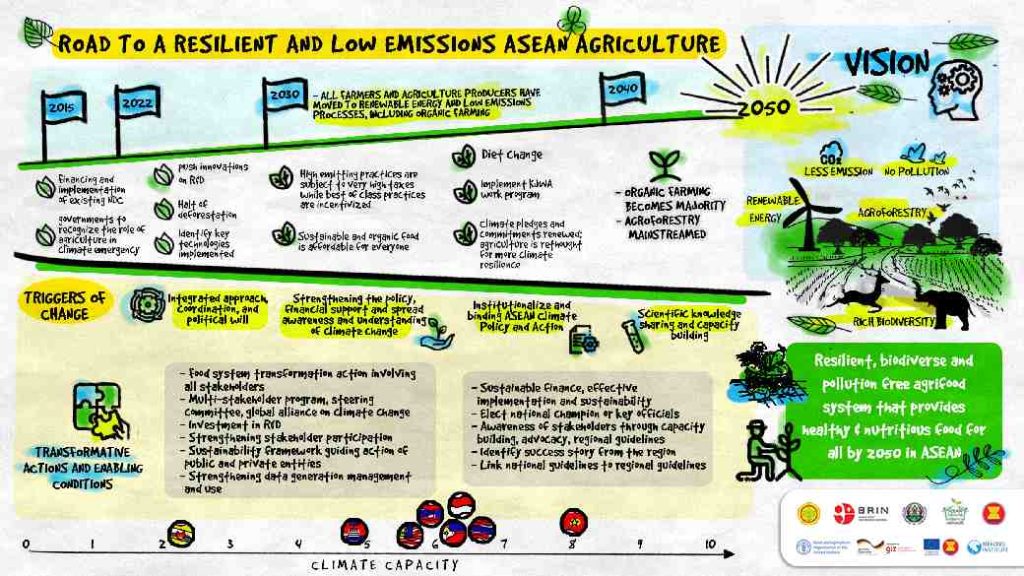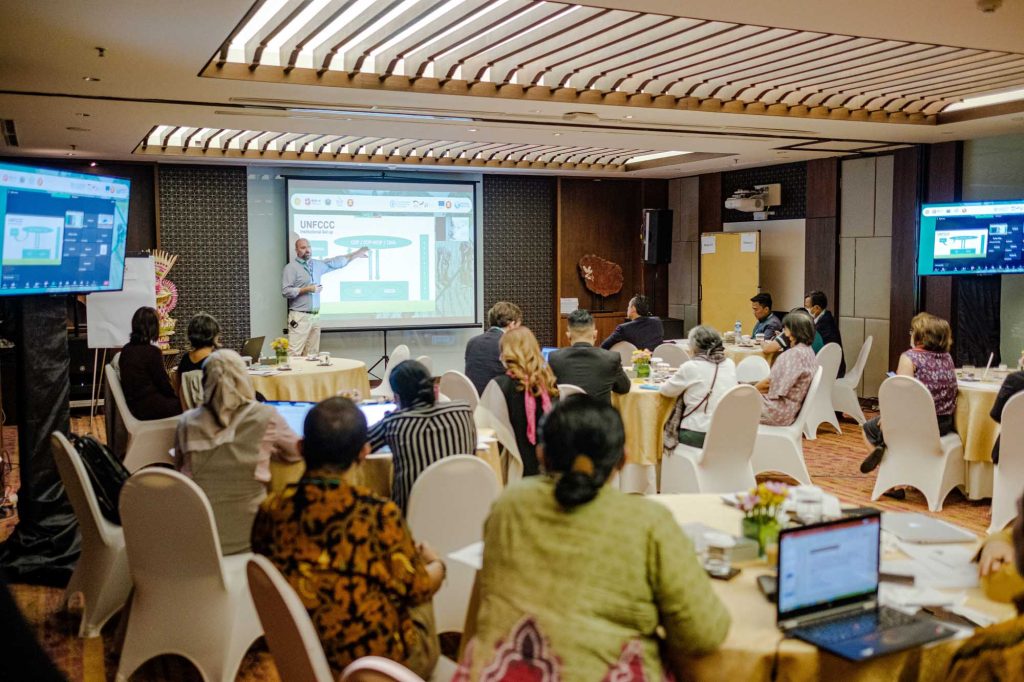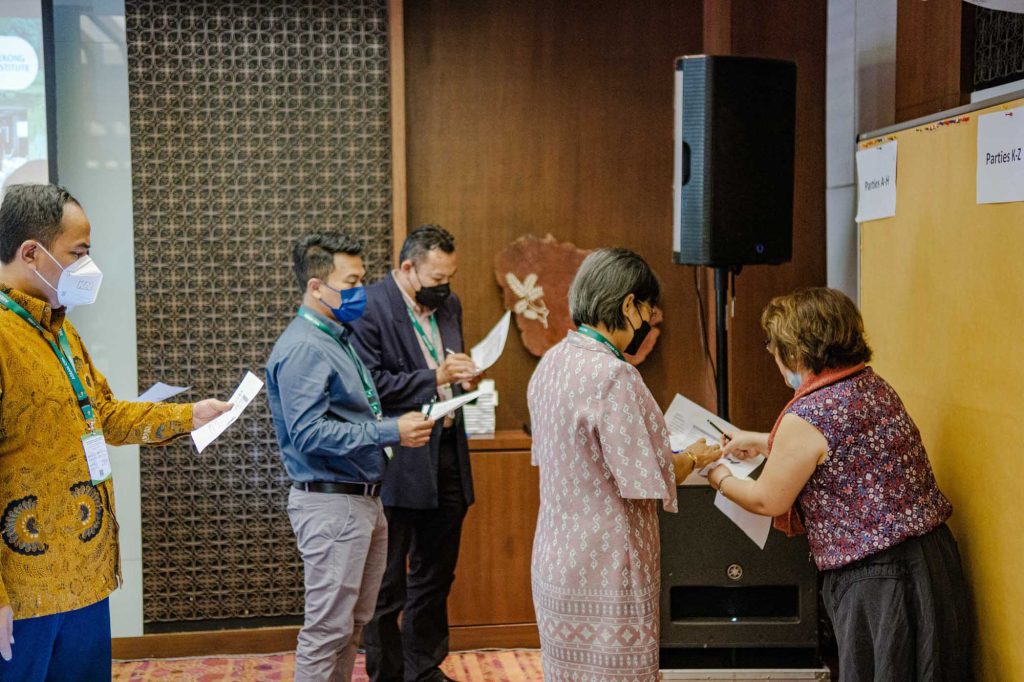In Southeast Asia, the agriculture sector transition is gaining momentum. Many stakeholders are joining forces to ensure that the region is heading toward net zero and low carbon emissions and will achieve its national climate targets.
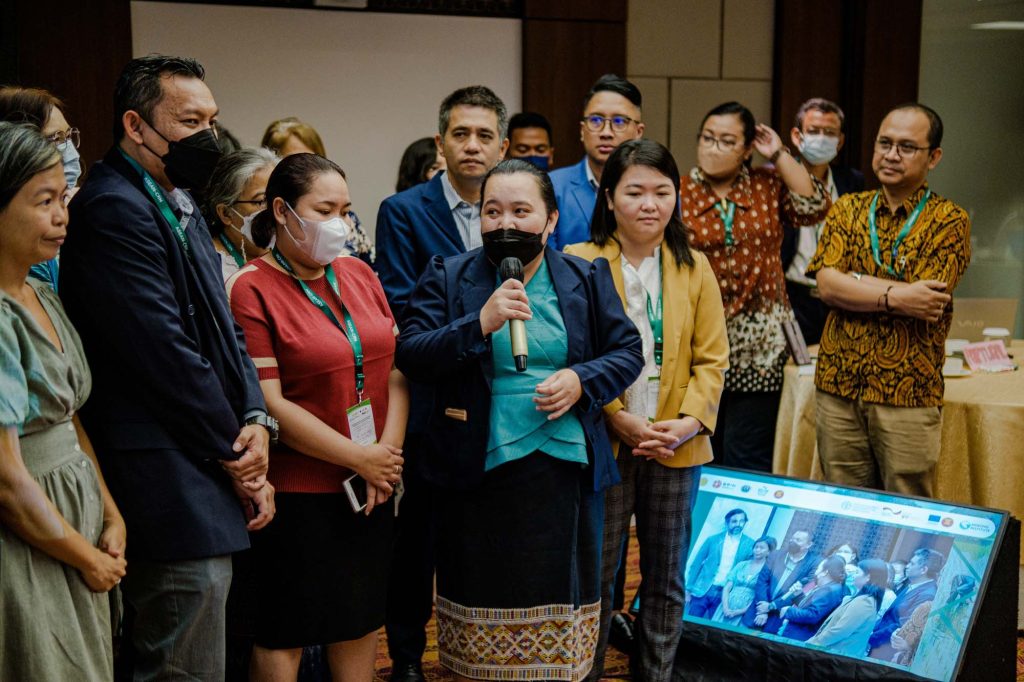
After energy, the agriculture sector is the second-biggest source of greenhouse gas (GHG) emissions. The upcoming UN Climate Change Conference (COP 27) in early November in Sharm El-Sheikh, Egypt, will continue the Koronivia Joint Work on Agriculture (KJWA) agenda item, highlighting the topic of agriculture and climate change.
Against this backdrop, national representatives as focal points of the ASEAN Climate Resilience Network (ASEAN-CRN) and partners gathered in Bali, Indonesia for an event held from 27 – 29 September on the theme “Transformation to Low Emissions and Resilient Agrifood System: A Knowledge Exchange Event and Climate Policy Negotiations Training”. The objective was for participants to learn more about net zero and low carbon emission concepts and their relevance for agriculture; to acquire basic knowledge and skills needed for the COP27; to exchange knowledge and experience among peers, and network.
The Indonesia National Research and Innovation Agency (BRIN), together with the Thailand Department of Agriculture (DOA) as Chair of ASEAN-CRN, hosted the event. This was organized in a hybrid format, allowing participants to join online and onsite. For the ASEAN-CRN focal points joining onsite, the event was an avenue for having face-to-face discussions and exchanges after two and a half years of extensive virtual collaborations.
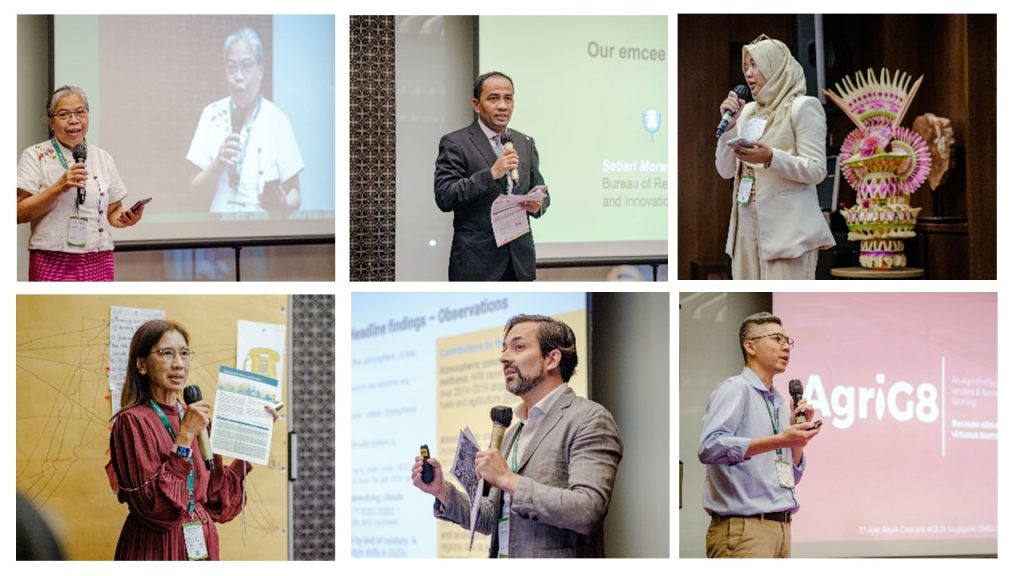
Assessing the feasibility to accelerate the region’s transition to a low-emission agrifood system
After the opening remarks from the host and partner organizations, the morning session of Day 1 provided participants with the experts’ overview of agriculture’s zero and carbon neutrality concepts. This was followed by an assessment of the feasibility of accelerating the region’s transition to low emissions and resilient agrifood systems.
To kick off the discussion, session 1 started with “Understanding carbon neutrality in agriculture”, with Mr. Beau Damen, Natural Resources Officer – Climate Change & Bioenergy, FAO-Regional Office for Asia and the Pacific (FAO-ROAP), giving a talk titled “Resilient & low emissions agriculture: The case for transformative actions”. He started the session by summarizing key findings from the Sixth Assessment Report of the United Nations Intergovernmental Panel on Climate Change (IPCC Report), which in principle calls for a major paradigm shift, particularly in food systems. He cited examples of negative impacts which have already occurred in various places, for example, the shift in seasons, decreased crop yields, and decline in animal health due to heat stress, among others. He then went on to present a few cases for action, explaining that “cuts in methane emissions can lead to a larger impact than cuts in CO2 emissions due to methane’s atmospheric half-life of less than a decade”. He ended his presentation by stressing the importance of climate-resilient and low-emissions agrifoods systems as a way to tackle climate change impacts and deliver adaptation and mitigation co-benefits.
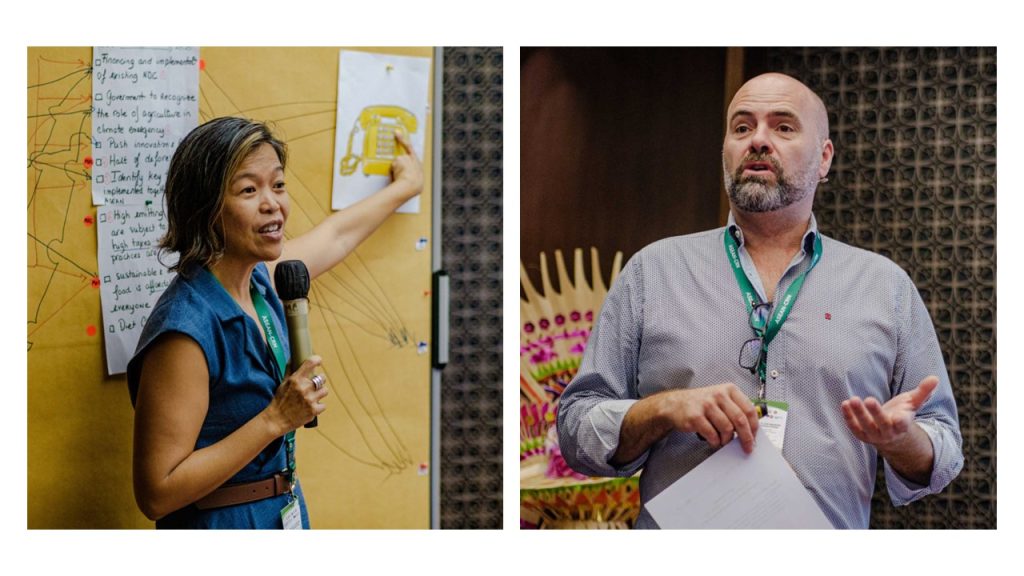
The next speaker, Dr Ciniro Costa Junior from the Alliance of Bioversity International and the International Center for Tropical Agriculture (CIAT), defined what decarbonization means in his presentation titled “Defining net zero, net neutrality and decarbonization in agriculture. Is this feasible for ASEAN?”.
“Decarbonization refers to measures through which a business sector or an entity or government organization or farm reduces its carbon footprints, primarily its GHG emissions, carbon dioxide, methane or nitrate oxide,” he explained. Whether or not the net zero agenda is feasible for ASEAN, Dr Ciniro noted that, “Even though it is ambitious, it is attainable and there is huge GHG emission mitigation potential from the land use and agriculture sectors, particularly in rice production, protection and restoration in the natural landscape.”
Led by the expert and graphic illustrator, the participants participated in the visioning exercise. The visioning exercise in the afternoon allowed CRN focal points to re-visit a visual vision map from March 2022. The visual map as a collaborative effort elaborated on common goals, values and actions.
The exercise now focuses on regrouping the future’s vision. In addition, it identified transformative actions and prioritized interventions. Lastly, the participants gained insights from the private sector, which shared business models on technology and finance for rice farmers.
In session 4, Mr David Chen, CEO of AgreG8, an Agri-FinTech platform from Singapore, gave an example of how technology was applied and supported MRV efforts on the ground in Myanmar. His presentation was titled “Use of technology and community involvement in MRV in rice fields” and centered on the pilot project involving 48 farmers from Myanmar. The main objective was to understand the motivation of farmers towards decarbonization, identify incentives to motivate farmers and create a preliminary baseline for carbon emission. According to David, “whether it is net zero or decarbonization, a baseline must be established. Since data collection is painful, it is worthwhile cultivating famers’ habits to perform self-recording.” Through the pilot project, his team did precisely this, helping to cultivate farmers’ habit of data collection through the use of an app. The result is a better way to collect data.
Day 1 concluded with a summary from Beau Damen, highlighting the importance of research and the important work of ASEAN CRN, as we continue to define ASEAN vision and pathways to net zero and carbon neutrality in agriculture. Next steps will include further definition of approaches — net zero, net neutrality, and carbon neutrality, among others, and a sharing of relevant activities from various agencies which will support ASEAN’s objective in defining the pathways.
Gearing up for COP 27
On day 2, the main focus was on the basics of the United Nations Framework Convention on Climate Change (UNFCCC) and negotiation processes and protocols. Besides the ASEAN-CRN, the ASEAN Negotiating Group for Agriculture (ANGA) focal points honed their climate negotiation skills in preparation for COP27.
Mr Gonçalo Cavalheiro, a long-time negotiator trainer, explained the UNFCCC framework and negotiation processes to the ANGA focal points. Besides an input presentation, a negotiation simulation where the ANGA focal points acted as climate negotiators also took place. To complement the training, several seasoned climate negotiators shared their insights and experience of attending the past COP. A panel discussion on “ANGA sharing on the UNFCCC negotiation” was held with Alicia Ilaga, Philippines ANGA Focal Point, Dr Margaret Yoovatana, Thai ANGA focal point, Mr. Azizi Ahmad Azmin, Malaysia ANGA focal point and Setiari Marwanto of the Bureau of Research and Innovation (BRIN) as panelists. Moderated by Dada Bacudo, the ASEAN CRN Coordinator, the brief sharing session covered ANGA’s background and experiences in negotiations and at COP. Ms. Alicia expressed the view that there was a need to put emphasis on the topic of agriculture at the negotiating table, not least because agriculture is a common issue among many ASEAN Member States (AMS).
Another reason was that the negotiations also involved an African group, Least Developed Countries and Small Island Development States, among others. It was thus strategically important to act as one regional voice and timely as the discussion was now moving towards implementation on the ground where agriculture has a crucial role to play. Dr Margaret told the audience how the ANGA group was formed thanks to the strong political support of Vietnam, the Philippines and Thailand in pushing forward with the proposal to gain official recognition from AMS. Mr. Setiari noted how he benefited from joining ANGA activities which, he said, gave him useful skills and knowledge for the COP while Mr. Azizi echoed his words, noting the usefulness of ANGA capacity building activities and the need to have a regional position.
On day 2, the main focus was on the basics of the United Nations Framework Convention on Climate Change (UNFCCC) and negotiation processes and protocols. Besides the ASEAN-CRN, the ASEAN Negotiating Group for Agriculture (ANGA) focal points honed their climate negotiation skills in preparation for COP27.
Mr Gonçalo Cavalheiro, a long-time negotiator trainer, explained the UNFCCC framework and negotiation processes to the ANGA focal points. Besides an input presentation, a negotiation simulation where the ANGA focal points acted as climate negotiators also took place.
To complement the training, several seasoned climate negotiators shared their insights and experience of attending the past COP. A panel discussion on “ANGA sharing on the UNFCCC negotiation” was held with Alicia Ilaga, Philippines ANGA Focal Point, Dr Margaret Yoovatana, Thai ANGA focal point, Mr. Azizi Ahmad Azmin, Malaysia ANGA focal point and Setiari Marwanto of the Bureau of Research and Innovation (BRIN) as panelists. Moderated by Dada Bacudo, the ASEAN CRN Coordinator, the brief sharing session covered ANGA’s background and experiences in negotiations and at COP. Ms. Alicia expressed the view that there was a need to put emphasis on the topic of agriculture at the negotiating table, not least because agriculture is a common issue among many ASEAN Member States (AMS). Another reason was that the negotiations also involved an African group, Least Developed Countries and Small Island Development States, among others. It was thus strategically important to act as one regional voice and timely as the discussion was now moving towards implementation on the ground where agriculture has a crucial role to play. Dr Margaret told the audience how the ANGA group was formed thanks to the strong political support of Vietnam, the Philippines and Thailand in pushing forward with the proposal to gain official recognition from AMS. Mr. Setiari noted how he benefited from joining ANGA activities which, he said, gave him useful skills and knowledge for the COP while Mr. Azizi echoed his words, noting the usefulness of ANGA capacity building activities and the need to have a regional position.
For a deeper dive into the discussion on the agricultural sector, Mr. Etienne Drieux from FAO Rome, was invited to give a presentation on an “Introduction to Koronivia Joint Work on Agriculture and Prospects for COP 27”. Many participants expressed interest in the KJWA, which potentially recommends a decision to adopt in COP27. He began his session by giving a background to KJWA and a roadmap of KJWA implementation. Later, he spoke about the COP27 Presidency Initiative, called FAST. Founded on a voluntary and collaborative process between FAO and main stakeholder groups, the initiative aims to improve the quantity and quality of climate finance contributions to transform agriculture and food systems by 2030, support adaptation and maintain a 1.5-degree pathway while supporting food and economic security.
George Wamukoya, lead agriculture negotiator under G77 and China, was next to take the stage, giving practical points for consideration during his session on “Introduction to the G77 and China negotiation group for Agriculture and main points for consideration at COP 27”. He provided a few important tips based on his past experience of attending many negotiations, saying,
The first is to study the informal note and identify what is still missing or unclear in terms of the language. In any negotiation, it is important to decide if you agree with it or not, or how it complements our decision. The second is to look at those whose positions are opposite from ours. Also, if the language is still vague, how it can be refined or how we can negotiate to delete it. Lastly, the role of the negotiator is not only to negotiate but also listen carefully.”
The day ended with a negotiation simulation where the ANGA focal points acted as climate negotiators.
Climate Policy Negotiations Training in Full Swing
Day 3 started with a role-play exercise where the trainer and the participants practiced negotiating as per the instructions and scenarios given. In doing so, all got a chance to experience the processes.
After the group exercise, FAO and GIZ representatives introduced an e-learning course on climate negotiations which is currently being developed. The target audience are junior members of the national delegations to the UNFCC, including those who have not participated in any formal or informal session of the bodies (COP, CMA or SBs).
“The training has helped us feel confident in climate negotiation.”
Feedback from a participant
Before joining the Climate Policy Negotiations Training, many participants mentioned that they did not have a clear idea of the basics of UNFCCC framework and climate-policy negotiation landscape. However, after an intensive 1.5 days of training, participants said how much the training had helped them to understand more about the UNFCCC framework and negotiation processes. All of them felt that the course content will greatly benefit their work as it involves soft skills that can be applied in their professional setting.
The focal points for the ASEAN Negotiating Group for Agriculture (ANGA) also met internally with the presence of the ASEAN Secretariat and ANGA’s Advisor, Ms Imelda Bacudo, to discuss practical preparations for COP27. Items discussed included understanding who will be going to Egypt, who will need support, and how the group can strategically negotiate jointly. The possibility of side events, joint support for the COP27 Presidency’s initiative for agriculture, and communication strategies with ASEC and AMAF were also discussed. The group has agreed to coordinate even more closely as COP27 nears.
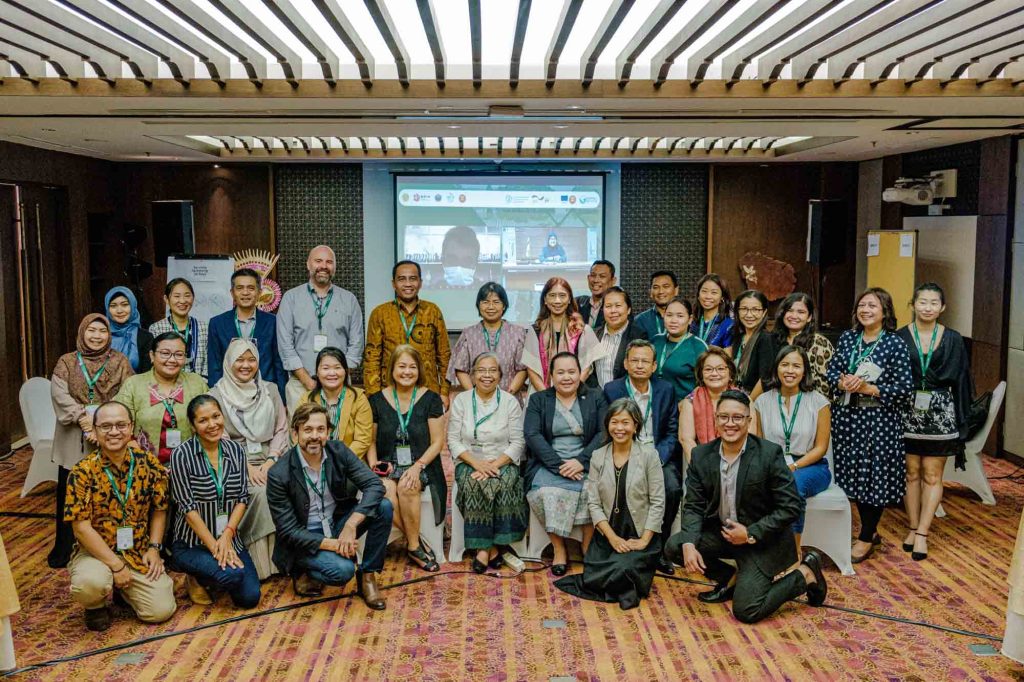
Organizations and support
The event participants consisted of national representatives as ASEAN-CRN and ANGA focal points, development organizations, non-governmental organizations and one start-up company from the ASEAN Member States. The organization of the event was supported by the Federal Ministry for Economic Cooperation and Development (BMZ) through the GIZ “Promotion of Sustainable Agricultural Value Chains in ASEAN” (ASEAN AgriTrade) with support from the Mekong Institute; the FAO-Regional Office for Asia and the Pacific (FAO-ROAP), and the Enhanced Regional EU-ASEAN Dialogue Instrument (E-READI).
All photos: GIZ/Anggara Mahendra
Reference:
Event Documentation page – Transformation to Low Emissions and Resilient Agrifood System: A Knowledge Exchange Event and Climate Policy Negotiations Training
Please visit the page to access the event material, including agenda, report, presentations and photos.
.
